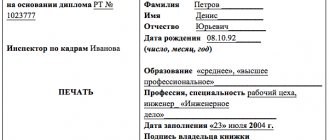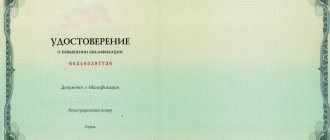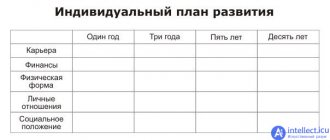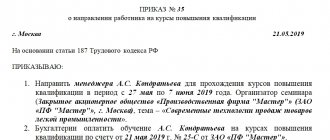The concept of professional standards, the scope of their application
Based on Art. 195 of the Labor Code of the Russian Federation, a professional standard is a document with a set of certain professional characteristics that employees must meet in order to perform specific tasks in their position.
The first drafts of such documents were recorded back in 2013. However, only since 2020, some of them have become mandatory for a number of employers, professions and positions.
Professional standards can be developed by employers independently or with the involvement of additional experts in the specified field. In addition, standards adjusted to the needs of a particular enterprise can also be developed to order in law firms, that is, by third parties.
The main requirement for the draft professional standard is the compliance of the provisions of the document being developed with the methodological instructions of the Ministry of Labor of the Russian Federation, the layout of the template professional standard, as well as the competent distribution of qualification levels in the document.
Upon the formation of the draft standard, together with the attached documents, it is sent to the Ministry of Labor of the Russian Federation for consideration and approval. The project can be rejected, accepted or sent for revision. The process of formation and adoption of such standards is recorded in the RF PP No. 23 dated January 22, 2013.
The scope of application of professional standards is the work activity of employed citizens. They are necessary to describe the subject's work process standards, as well as the required level of his experience, practical skills and education.
In particular, qualification levels describe the following requirements for an employee:
- the presence of specific knowledge and skills in accordance with the profile of the professional standard and the position of the subject;
- the required level of qualifications that meet the job responsibilities of the subject, as well as his powers.
Results
Qualification levels when developing draft professional standards help to more clearly create a qualification description of an employee’s job function.
There are 9 qualification levels in total. They are the basis for assessing the general set of knowledge and skills of an employee sufficient to perform certain job functions. You can find more complete information on the topic in ConsultantPlus. Full and free access to the system for 2 days.
Adjustments to the labor legislation of the Russian Federation in 2016-2017.
Skill levels are a necessary assessment step when entering a job. Compliance with the subject's knowledge is an opportunity for potential employment in the desired position.
Starting from July 2020, each employee of the organization must meet the professional requirements of qualification levels, if this is enshrined in local regulations or the Labor Code of the Russian Federation.
However, professional standards do not apply to the list of specialties whose activities are not related to receiving benefits. Also, the standards regulations do not apply to those professions whose labor functions are not clearly described in any legislative act. Thus, for government employees, compliance with standards is mandatory; for most commercial structures, this rule is advisory in nature.
Any commercial company has the right to develop local regulations or job descriptions based on the state professional standard in accordance with the needs of the enterprise.
In addition, based on the RF PP No. 23 dated January 22, 2013. such employers are provided with the right to independently formulate standards. And from 01/01/2017 the manager, if required by the current situation in the organization, can, on his own initiative, certify a subordinate in order to determine the level of his current qualifications. Also, in case of non-compliance with the qualification level of the position held by the subject, the person may be sent to further education courses.
Why are professional standards needed?
A professional standard is the name of an important fundamental document containing a description of the following standards:
• labor functions of the employee in accordance with his qualifications and position; • requirements for his experience and knowledge.
Thus, we can say that professional standards include a description of the qualitative level of qualifications of an employee, which he must meet in order to rightfully take his place on the staff of any company, regardless of the type of its activity (Article 195.1 of the Labor Code of the Russian Federation).
Why are professional standards needed: distribution of responsibilities
First of all, the professional standard for personnel officers in 2016 delineates the areas of activity of HR service employees. Now the responsibilities of each specialist are clearly regulated.
Based on the contents of the new documents:
• office management specialists are engaged in the preparation of primary, accounting, planning and organizational and personnel documents (orders, instructions), as well as their registration and submission for archival storage;
• employees involved in personnel selection collect and systematize information about the company’s current personnel needs, select new employees, interact with government agencies and private individuals who oversee employment issues;
• HR managers assess the qualifications of employees, organize and conduct their certification;
• development specialists select advanced training courses and other activities that contribute to the career growth of employees;
• managers for standardization and remuneration supervise issues of adjusting the system of wages and incentives, developing principles of non-material motivation;
• social policy managers are involved in the development and implementation of relevant social programs and monitor the correctness of their implementation;
• employees whose competence includes resolving personnel migration issues are engaged in the transfer of employees from one structural unit of the company to another, as well as in the employment of persons who do not have Russian citizenship;
• managers organize the uninterrupted operation of the department entrusted to them, monitor the correctness of the execution of documents and their compliance with the norms of current legislation, and also prepare internal management reporting.
Positions falling under the regulations of professional standards and qualification requirements
Positions for which professional standards are mandatory:
- employees of the educational sector on the basis of Federal Law No. 273 “On Education” dated December 29, 2012;
- cadastral engineers, based on Federal Law No. 221 “On the State Real Estate Cadastre” dated July 24, 2007;
- doctors and pharmacists, based on Order of the Ministry of Health No. 707 of October 8, 2015;
- pilots, relying on Order of the Ministry of Transport of the Russian Federation No. 147 dated September 12, 2008;
- legal professionals on the basis of Federal Law No. 63 “On Advocacy” dated May 31, 2002;
- auditors, based on Federal Law No. 307 “On Auditing Activities” dated December 30, 2008;
- senior or chief accountants of some organizations, relying on Federal Law No. 402 “On Accounting” dated December 6, 2011;
- forensic experts working in government agencies are based on Federal Law No. 73 “On forensic activities in Russia” dated May 31, 2001;
- employees working in municipal institutions, based on Federal Law No. 79 “On Civil Service” dated July 27, 2004;
- judges, based on Federal Law No. 3132 “On the status of judges” dated June 26, 1992.
The highest pedagogical level of professionalism
It should develop in them strong knowledge, skills and abilities that ensure high-quality and quantitative performance of work, as well as the ability to use new equipment, modern technology and advanced labor methods.
But the rights of workers must not be violated, therefore in a number of companies any actions of the manager are coordinated with the trade union body. Very soon we will all begin to build our work in accordance with the system of professional standards, but there are still many questions about their application.
Qualification levels of professional standards
Qualification levels describe the authority and responsibility of employees in specific positions, as well as the necessary skills and level of education to perform job functions.
In addition, the text of the document also reflects special conditions that can be met by the subject to obtain the desired qualification. In particular:
- undergoing training on the profile of the profession;
- obtaining the required educational level through special programs;
- obtaining additional technical or higher education in the profile of the position held;
- having a certain number of years of work experience.
Thus, qualification levels are divided into 9 categories:
- First level. It is expected to perform the simplest tasks using physical labor and basic factual knowledge. The possibility of obtaining such qualifications is simple - it is enough to undergo instructions before directly performing the tasks. Practice also shows that many employers do not require experience at this qualification level. At the same time, experience is often not of decisive importance.
- Second and third levels. This implies the execution of standard tasks, the theoretical basis of which can be obtained based on primary education in a specific professional profile. In addition, such an employee will also have to undergo retraining to become familiar with the specifics of production activities.
- Fourth and fifth levels. This type of qualification implies initial skills in personnel management. In addition, the employee is required to be able to bear responsibility for the results of the work of the entire department. The requirements for this qualification include secondary vocational education or general vocational training according to a standard state educational program with retraining.
- Sixth level. This qualification implies having a higher education category “bachelor” or secondary specialized education. This allows the employee to have the skills to work outside the team, as well as the ability to manage a large working group of subordinates (branch or institution). Such an employee should perform functions to improve specific technological aspects or methodological developments in order to improve the production process as a whole.
- Seventh level. This qualification category is suitable for management personnel of the highest level. This refers to managers of large companies or individual branches of large-scale institutions. Thus, such an employee must possess strategic planning techniques and a high level of skill in managing a large number of personnel. In addition, such subjects are also subject to high educational requirements. Such employees must have a specialist or master's level education in a specific field of activity.
- Eighth and ninth levels. They require the necessary knowledge and skills to work in leading positions in global corporations or the state, as well as large-scale research activities. Educational requirements are also high: the subject must have a higher education in the category of master's or specialist, as well as a scientific degree (that is, completion of graduate school, adjunct or residency).
On approval of professional standards for personnel officers for 2020
In the field of personnel work, the following professional standards are currently in force:
1. “Human Resources Management Specialist” (approved by order of the Ministry of Labor of the Russian Federation dated October 6, 2015 No. 691n). This document contains qualification requirements for heads of human resources departments, personnel service employees and HR and career guidance specialists.
2. “Personnel selection specialist (recruiter)” (approved by order of the Ministry of Labor of the Russian Federation dated October 09, 2015 No. 717n). This standard contains requirements for recruiters and HR managers, whose responsibilities include exclusively searching for employees and their initial adaptation in the workplace.
The standard itself consists of 4 sections: 1. General provisions. 2. Description of labor functions included in the professional standard. 3. Characteristics of general labor functions. 4. Information about the organizations that developed the professional standard.
Professional HR standard: what to choose
When choosing the appropriate professional standard, the employer should be guided by the range of responsibilities of a particular specialist. Depending on the size of the organization, the responsibilities of a human resources specialist can be distributed among several employees or assigned to one person.
According to the recommendations of the Ministry of Labor of the Russian Federation, the employee’s duties should indicate the labor functions and (or) labor actions that the employee must perform within the framework of his position, taking into account the tasks and functions of the structural unit.
In addition to the cases provided for by federal laws, taking into account the Labor Code of the Russian Federation and the specifics of the activity, the employer can also:
- distribute labor actions between several positions (professions, specialties), independently determining the content and volume of work performed by the employee;
— expand the list of labor actions for individual positions (professions, specialties) in comparison with the list from the professional standard.
It is worth emphasizing once again that, in accordance with labor legislation, it is impossible to change an employee’s job function without his consent.
Changing the terms of the employment contract determined by the parties, including changing the employee’s labor function, is possible by agreement of the parties (Article 72 of the Labor Code of the Russian Federation).
With the exception of the employee's labor function, the terms of the employment contract can also be changed at the initiative of the employer (with notice to the employee 2 months in advance), for reasons related to changes in organizational and technological working conditions, and when it is impossible to maintain the previous terms of the employment contract.
World class skills
As part of the federal project “Young Professionals” with a total value of more than 156 billion rubles. (part of the national project “Education”) it is planned to update the infrastructure of colleges in all regions, and by 2024 to equip more than 5,000 workshops according to modern standards, including WorldSkills standards.
Russia joined the international WorldSkills movement in 2012. Five years later, regional championships “Young Professionals” (WorldSkills Russia) were already held in all 85 constituent entities of the Russian Federation, and students from 2,000 secondary vocational education organizations participated in them, according to a review by the Higher School of Economics.
The international movement WorldSkills aims to popularize professionalism and work excellence, says Svyatitskaya, including holding competitions and cooperation with training sites, such as the Moscow Technopark.
WorldSkills International organizes international championships of professional skills, Russia not only successfully participates in them, but also strives to transfer this methodology to the vocational education system, says Dudyrev.
WorldSkills Russia











